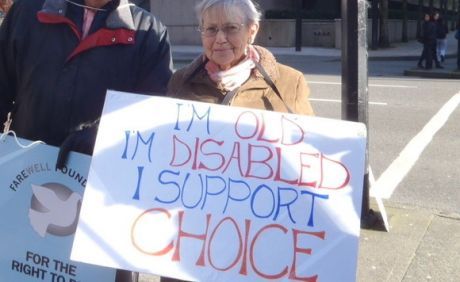Shared
You are here
Ableism, not assisted suicide, is what we need to work against

February 8, 2015
The Supreme Court decision on assisted suicide brings up a lot of questions for Canadian disability activists, and some fear, but I think it’s worth looking at why we still have this fear.
I’d like to position myself in this conversation by noting a few things. The first is to acknowledge that within the disability community I hold a fair bit of privilege. As a white, well-educated, employed disabled activist I am aware that other disabled people face greater barriers and oppression and will likely have more to fear from this decision than I do, and I’m not saying that fear is misplaced. I am also a person who has attempted suicide in the past, and I have the privilege to be able to say that without shame. I was young and fighting many years of unnamed depression and ableism that I have since been able to climb out from. I have also known people for whom assisted suicide may have been a compassionate end to their suffering if that choice were possible at the time.
There are many disabled people who understandably feel that they’ve been made more vulnerable by this decision. It brings up many questions about what constitutes a valuable life. What does that mean for people who require assistance with daily activities of life? Does it impact the value of a disabled person’s life in the context of a capitalist society where the ability to produce, make and spend money, has become a mark of human value? What does it mean for mad people and psych survivors whose decisions to end their lives are often controlled by the medical community?
The reason I chose to try to end my life over a decade ago is a complicated one, but ableism, and my understanding of myself within society played a big role. This is a struggle that faces many disabled people still. The idea that we are burdens, and second-class citizen where other “experts” make choices and decisions about our lives is still as ever-present as it was then. The idea that needing help, and being anything less than 100% self-sufficient and independent makes us burdens; that we must all “overcome our disabilities” is holding us back. Yet this is the image we see presented to us not just in the media, but by the organization and presentation of some of our most cherished disability organizations. Yes, there are disability organizations in Canada promoting the oppression of other disabled people through their own internalized ableism. Their inability to recognize the privilege of their membership has silenced those who are more oppressed.
So what do we do about it? We can start with opening our doors and minds to a shift in the disability movement; one with zero tolerance for oppression within its ranks. One where working disabled people work towards becoming allies to people on social assistance, where disabled athletes can talk openly about needing supports. Most importantly we evolve our organizing to a level where disabled people are each experts in the disability experience, and all of us are equally valuable. We can no longer tolerate a movement or organizational community that positions non-disabled people as our champions and runs rampant with classism, racism, sexism, ableism, or any other form of discrimination.
The decision made by the Supreme Court of Canada on assisted suicide is about choice, and we too have a choice. We can choose to allow this decision to divide us into “achievers” and “victims”; or we can reject that ableism. We can use our collective power as disabled people to define lives worth living in terms that include all disabled people. This does not have to conflict with the right of other people who would make that choice. We have no reason to fear assisted suicide if we can overcome ableism within society and within ourselves. We have that choice, let’s choose to start now.
This is reposted from the blog exposingableism
Section:










